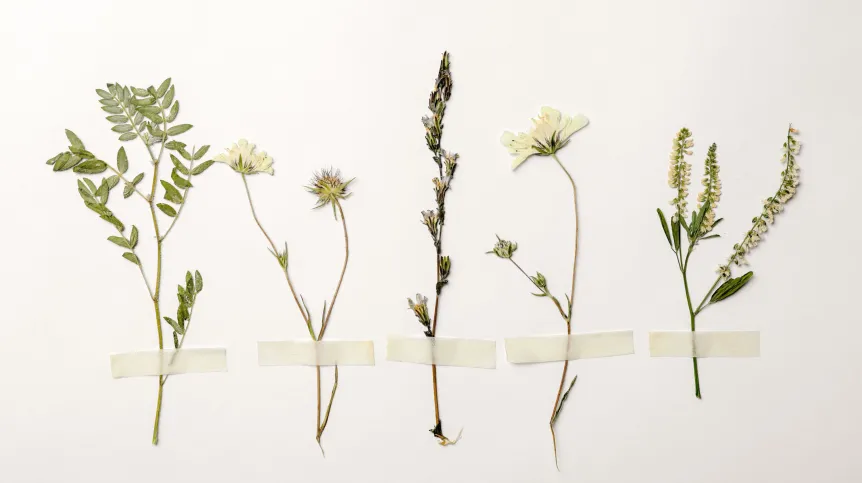
A disproportionately large number of plant specimens from around the world are found in European countries and in the USA. There are 65 million specimens in the 10 largest herbaria. The legacy of colonialism shapes the management of plant collections and this should change, says Professor Wiesław Mułenko from the Maria Curie-Skłodowska University.
Professor Wiesław Mułenko from the Maria Curie-Skłodowska University in Lublin is among the researchers whose research results were published in Nature Human Behaviour.
'With this publication, we want to draw attention to the discrepancy in the treatment of scientific plant collections between countries with a colonial past (usually rich ones), colonized countries and countries without such history. Rich countries are capable of taking care of collections of high scientific value, while others are not. They have insufficient funds and staff. For example, in Poland, only some universities have permanent herbarium curators. Most activities in the area of securing collections and making them available are carried out by researchers themselves or (occasionally) by technical staff. It is still extremely difficult to secure funding (e.g. in the form of grants) for working with herbaria', says Professor Wiesław Mułenko, a mycologist from the Department of Botany, Mycology and Ecology at the Maria Curie-Skłodowska University.
Plant collections, known as herbaria, are central to botanical research. They also provide the necessary data on climate change, increasing environmental pollution, extinction of species or the spread of invasive species. The initial history of herbaria is closely related to colonialism, as the formation of many scientific collections began with expeditions in the colonial era. The situation changed only after the outbreak of the Second World War. However, until now no one has presented a quantitative analysis of the collections of botanical specimens taking into account the influence of colonial politics.
'It is interesting that we have always been interested in floral motifs from the artistic point of view. Museums, also in Poland, are eager to organize exhibitions of engravings from the era of Linnaeus, Maria Sibylla Merian, or pastel iconography of plants and mushrooms by Konstanty Prószyński from the Vilnius region. Eliza Orzeszkowa and Stanisław Wyspiański wrote about herbaria, and Wisława Szymborska decorated many of her poetry volumes with plant motifs in collaboration with graphic artists and botanists. There are so many such stories. Meanwhile, Polish herbarium collections, although significantly co-financed by the Foundation for Polish Science in 2004-2006 (BIOS programme), are still not sufficiently described and require a lot of effort to be fully reviewed', Mułenko says.
There are 3,426 registered herbaria around the world, with 400 million plant specimens. According to the expert, the lack of interest in the analysis of the content of herbaria is also evidenced by the fact that only 92 scientific centres with herbarium collections responded to the request of the first author of the paper published in Nature Human Behaviour to share basic information.
In his research work, Daniel Park from Purdue University in the USA focuses on the biogeographical history of the evolution of species. Together with an international team, he analysed over 85 million specimens from online databases. They managed to obtain information on 92 herbaria in 39 countries. Scientists have determined that herbaria in countries with a colonial history contain more specimens and species than those found in previously colonised countries in Africa, Asia and South America. Specifically, more than 60 percent herbaria and 70 percent of the specimens are found in developed countries with a colonial history.
It would not be surprising were it not for the fact that the Nairobi Convention (1992) and the Nagoya Convention (2010) specify very clearly that part of the material obtained legally (the so-called doublet) should be left in the country of origin.
'We have a rule that if we collect and identify something, we keep one specimen for ourselves and leave the other in the herbarium in the country of origin. We also often send another specimen to a third location (for security reasons)', Mułenko says.
The authors of the paper write directly that to this day the areas of third world countries have the greatest biodiversity. Rich countries exploring these areas should therefore, in their opinion, provide the poorer countries with the opportunity to conduct research on site, help secure collections, support infrastructure, but also include local specialists in teams that submit applications for research funding (e.g. grants). They also provide specific arguments.
'Much of the world [is] reliant on botanical knowledge and resources housed outside of their own borders. This disparity not only impacts capacity for conservation and basic research, but commercial and government enterprises that seek to appropriate and monetize biological resources and their derivatives as well. In addressing this disparity, recent discussions regarding approaches to decolonize cultural institutions, natural history museums, and biogeographical practices in general must be applied to herbaria as well', we read in the paper.
The researchers note that although some countries have made efforts to digitise herbarium collections, only a small percentage of the collections have been transferred to a digital form.
'Though massive digitization efforts have been funded, particularly at institutions in developed countries, it is ironic that even these institutions often lack the funding for adequate curation and processing of specimens', the scientists write.
Professor Wiesław Mułenko emphasises that herbaria are a mine of knowledge for many specialists, representatives of such fields as history of science, geobotany, physiography, nature conservation or phylogenetics. However, at this stage, such activities are very difficult, because on the one hand, digitisation is progressing quite slowly, and on the other hand, few institutions provide information about their collections for free. Herbaria are therefore an example of very unequal access to botanical knowledge, because only a few can afford access to this knowledge.
'It must also be said directly that herbaria are not only the result of scientific research, but also colonial politics. Local communities were often forced to give away their knowledge for free, instead of selling it and making a profit', Mułenko says.
'It would seem that the era of colonialism has long passed, but the example of the management of herbarium resources shows that its heritage is still present. It is the responsibility of the rich countries to admit this and start changing it. For example, through a financial contribution to the digitisation of collections. But it is also necessary to ensure that digitisation does not become a form of neo-imperialism', emphasises Mułenko.
The expert admits that he also notices changes for the better.
'Scientists are beginning to see the need to include knowledge obtained from indigenous peoples in their analyses, they want to better understand the relationship between man and nature', says Mułenko. (PAP)
PAP - Science in Poland, Urszula Kaczorowska
uka/ bar/ kap/
tr. RL













